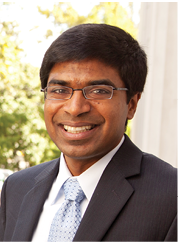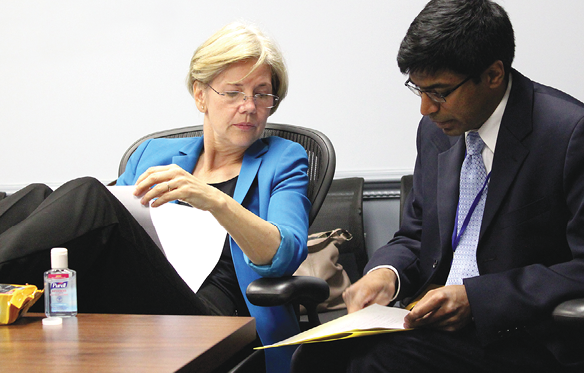
The portrait of President John F. Kennedy hanging in Assistant Professor Ganesh Sitaraman’s office at Vanderbilt Law School reflects Sitaraman’s vision of a great political leader—a capable intellectual who is also a dedicated statesman. Sitaraman returned to Vanderbilt last summer after working for another political leader in that mold—Massachusetts Senator Elizabeth Warren—as policy director during her successful 2012 Senate campaign and as senior counsel in the United States Senate.
Appointed to Vanderbilt’s law faculty in 2011, Sitaraman took a two-year leave of absence to help Warren, his former professor at Harvard Law, with her campaign and transition to office. During the campaign and in the Senate, Sitaraman’s work spanned an extraordinary range. “I worked on a variety of policy issues—health and education, foreign policy, banking and finance, energy and environment,” he said. He also worked with Warren’s press team to respond to media inquiries, helped prepare for debates, assisted with campaign politics and strategy, and wrote speeches. “Working on the campaign is a 24/7 job,” he said. “The pace is incredibly quick, and the work is challenging and exciting.”
Sitaraman developed an early interest in government and politics. “As a kid, I found the American Revolution and the writing of the Constitution truly inspiring,” he said. “It was extraordinarily bold for the founding generation to take charge of their destiny and create a whole new form of government, and they succeeded in part because they were not just political leaders, but intellectuals. They studied history, philosophy, politics and international affairs, and applied their knowledge to the world.” The son of Indian immigrants, Sitaraman credits his parents with instilling him with ideas about public service as a duty and a privilege. “My parents see America as a land of opportunity and also as a place where, if you make it, you shouldn’t pull up the ladder behind you,” he said.

Sitaraman’s admiration for Warren began on his first day of law school; Warren taught his Contracts class. “She is passionate about fighting for working families, but also believes deeply that we shouldn’t believe we are at the mercy of forces that are bigger than ourselves—we can come together and decide how we want to live and what kind of future we want to have as a people,” he said. “Those commitments really resonate with me.”
At Vanderbilt, Sitaraman welcomes the opportunity to teach students some of the lessons he learned working on Warren’s campaign and in the Senate. He also plans to continue working at the intersection of academic scholarship and public policy. “I’m interested in bridging the world of ideas and the world of practice—to bring some of each to the other,” he said. “If you work in the world of ideas, you can engage the hard questions, and that gives you the perspective to create better policy. When you work in government and politics, you gain a deep understanding of real-world constraints and where you can make progress. The hope is that you can do better in each arena because you understand the other.”
After earning his law degree at Harvard, Sitaraman was one of the first civilian academic researchers at the Counterinsurgency Training Center–Afghanistan in Kabul, during which he completed research for his book, The Counterinsurgent’s Constitution: Law in the Age of Small Wars (Oxford University Press, 2012), which recently won the Palmer Civil Liberties Prize. He was also recently named a senior fellow at the Center for American Progress.
“I’m very excited to be at Vanderbilt,” he said. “People here are interested in research and teaching that is relevant to the world. Today’s challenges require new thinking in public law, whether on the legal issues arising from terrorism, climate change or the economic crisis, and controversial issues like ‘too big to fail,’ drone strikes, Internet freedom and privacy, gun control and Obamacare all involve the interplay of law, policy and politics.” Sitaraman could not be better positioned to tackle those challenges.